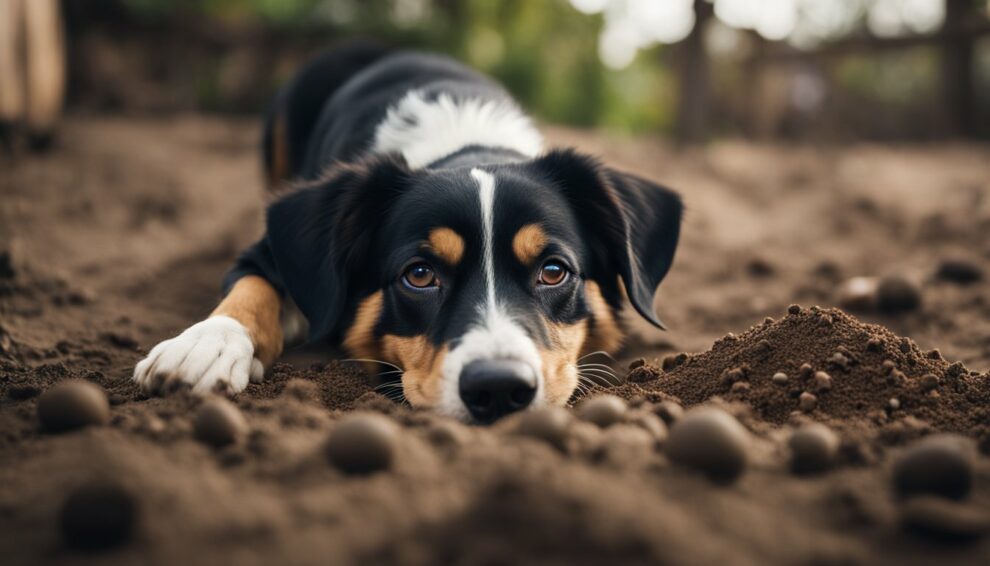We often notice our dogs engaging in quirky behaviors that might seem peculiar at first glance.
One such habit that can raise eyebrows is when our canine companions start eating dirt.
While it might just seem like another doggy oddity, dirt eating, or ‘pica,’ can actually be a sign that our furry friends are trying to tell us something about their health or diet.
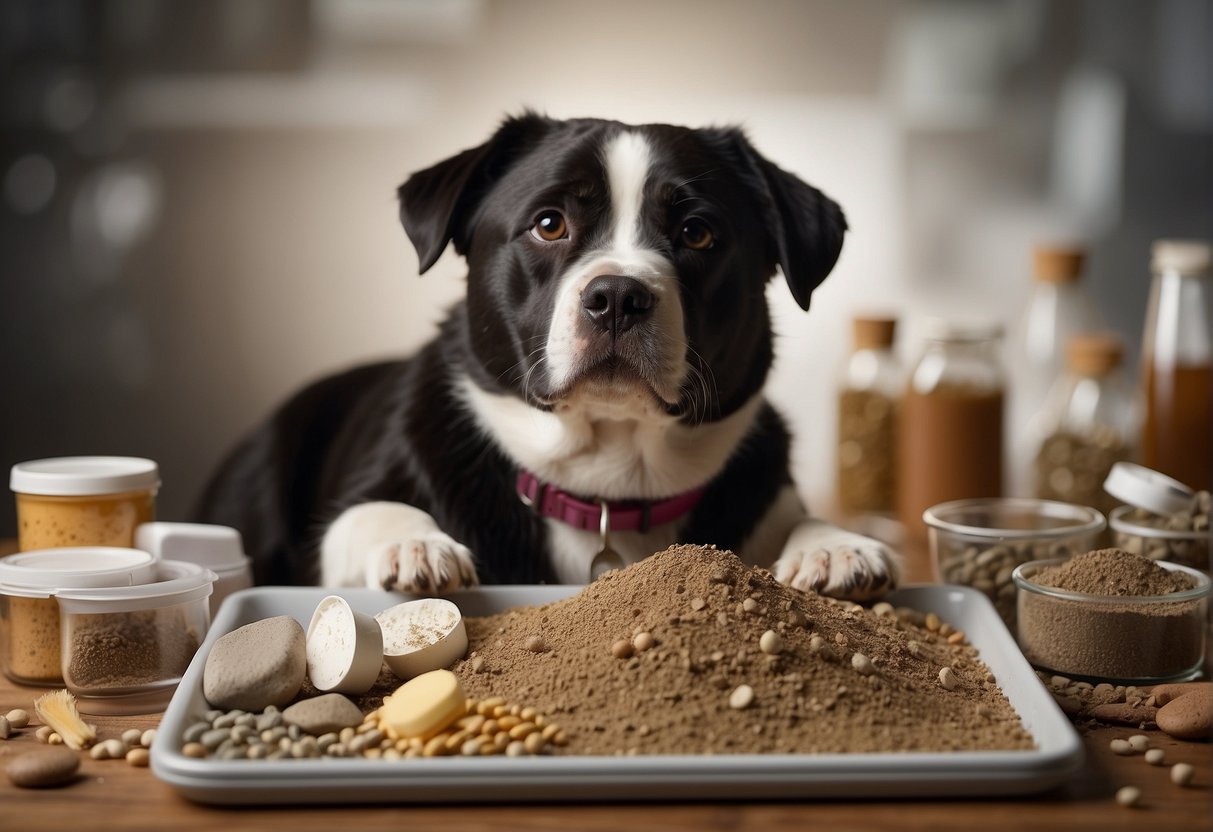
Understanding why dogs eat dirt is critical for ensuring they receive a balanced diet and maintain good health.
Some experts suggest that this behavior may be driven by a nutrient deficiency, and it’s our responsibility to decode these signals.
We must consider what essential vitamins and minerals might be lacking in their diet that is prompting them to turn to the earth in their search for nutrients.
By observing this behavior closely, we can become more attuned to our dogs’ needs.
Ensuring they receive a wholesome diet that includes all the required vitamins and nutrients is one of the most caring actions we can take as pet owners.
This proactive approach can help discourage dirt eating and support our dogs’ overall well-being.
Understanding Pica in Dogs
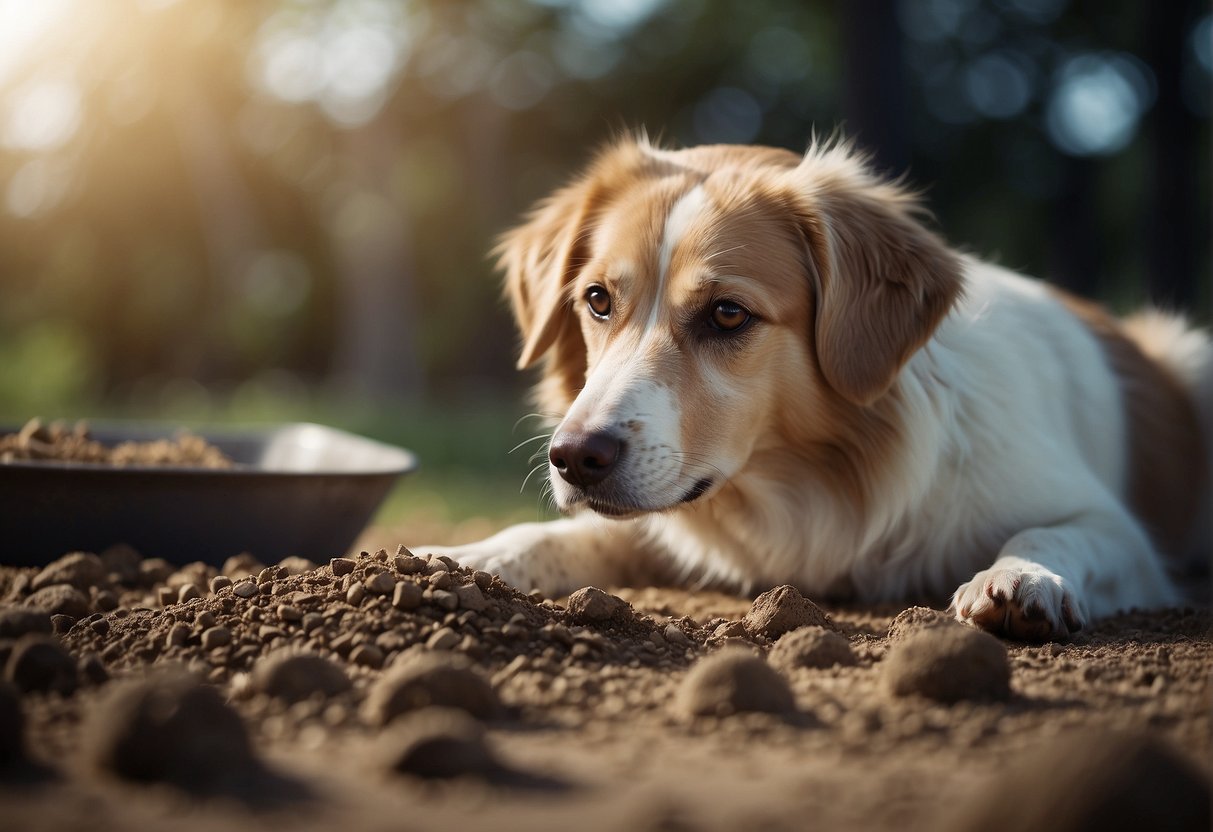
When our dogs start eating things that aren’t food, like dirt, it can be a condition known as pica.
Pica in dogs is a behavioral issue where they consume non-food items.
This unusual eating habit may signal that they’re missing something in their diet, possibly certain minerals or nutrients.
Nutritional Imbalance is often at the core of pica.
When our furry friends don’t get enough vitamins and minerals from their diet, they might instinctively try to correct this by eating dirt or other non-nutritive substances.
This behavior can point to a mineral deficiency or a broader nutrient deficiency.
Here’s what we should look for:
- Minerals: Dogs need a balance of minerals like calcium, phosphorus, and magnesium.
Eating dirt can indicate a lack in one of these essential minerals.
- Diet: An incomplete or unbalanced diet might be the reason our dog starts searching for nutrients elsewhere.
Evaluating our dog’s diet and ensuring it meets their nutritional needs can help manage or prevent pica.
Keep in mind, though, pica can also arise from non-nutritional issues, such as behavioral problems.
If we notice our dog showing signs of pica, we should take them to the vet to rule out any underlying health concerns and to discuss the best course of action.
To better understand the complications linked with pica, we might want to review reputable sources like Understanding Pica in Dogs to learn more about symptoms and treatments.
Common Causes for Dirt Eating
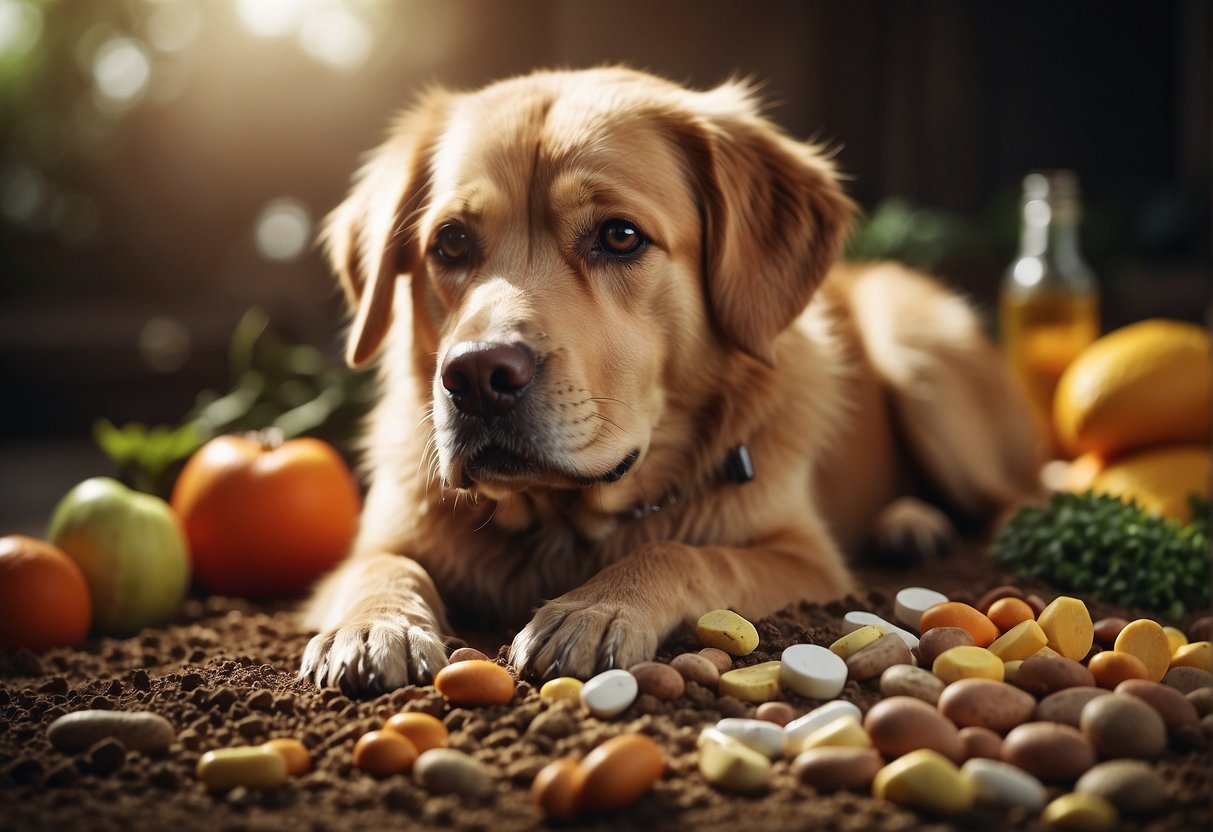
When our dogs eat dirt, it’s important for us to understand the potential underlying issues.
It may signal anything from a nutritional gap in their diet to behavioral challenges they’re facing.
Let’s explore the main factors that could lead our canine friends to this unusual habit.
Nutritional Deficiencies
Nutrition is fundamental to our dogs’ health, and a lack of certain minerals in their diet could lead to dirt eating.
For example, dogs with anemia might consume soil as they instinctively seek out iron, which their bodies are lacking.
Additionally, an imbalance or deficiency in other key nutrients, like calcium or phosphorus, can drive our dogs to eat dirt in an attempt to rectify the shortfall.
Behavioral Issues
Our dogs may also engage in dirt eating due to behavioral issues such as boredom, stress, or anxiety.
If they’re not provided with sufficient physical and mental stimulation, this behavior can manifest as a way to cope with their frustration or unease.
Addressing these issues often involves increasing exercise, interactive play, and sometimes behavior modification techniques.
Environmental Factors
Lastly, environmental factors play a role.
Dogs are curious and explorative creatures; sometimes, they may eat dirt simply out of curiosity or to explore a new environment.
However, it’s critical to ensure that the soil is free of toxins that can be harmful to their health.
In some cases, parasites in the dirt can pose a risk, so it’s advisable to discuss any unusual eating habits with your veterinarian to rule out these concerns.
Health Risks of Ingesting Dirt
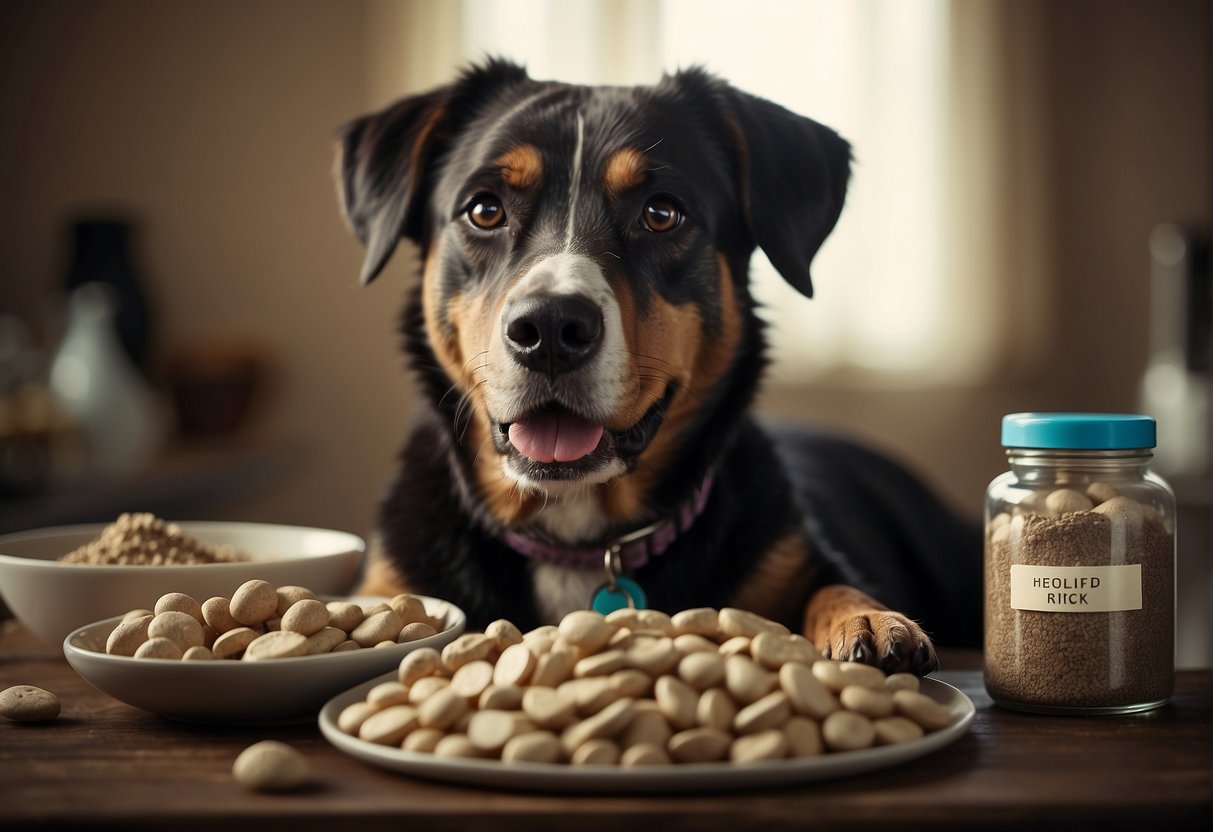
When our canine friends eat dirt, we might initially think it’s a harmless quirk, but the habit might pose several health risks.
The ingestion of dirt, or geophagia, can lead to a variety of issues in our dog’s digestive tract.
Here’s what we should watch out for:
-
Intestinal Impaction: If a dog eats a significant amount of dirt, it could compact in the intestine, becoming an impaction.
This blockage often leads to constipation or can be severe enough to require surgery.
-
Toxins and Chemicals: Dirt may contain toxins from fertilizers or pesticides, which are dangerous to a dog’s liver and overall health.
Sometimes, these contaminants cause symptoms like vomiting, diarrhea, and upset stomach.
-
Bacteria and Parasites: Soil is a potential home for harmful bacteria and intestinal parasites.
These unwanted guests can lead to infections or more severe health issues.
-
Nutritional Imbalance: Dogs might eat dirt due to a lack of certain minerals in their diet, like phosphorus or iron, which is crucial for hemoglobin.
However, too much dirt can interfere with the absorption of nutrients, potentially leading to pale gums and other problems.
-
Physical Injury: Eating dirt may seem like less of a risk compared to chewing on toys or other objects, but it can still cause physical damage to the stomach and teeth.
As pet owners, it’s important for us to be aware of these risks and understand that if our dogs are consuming dirt regularly, it could be a cry for help indicating an underlying health issue or dietary need.
Vitamins and Minerals for a Balanced Diet

When we notice our dogs eating dirt, it may be a sign they’re seeking out essential nutrients missing from their diet.
Let’s ensure we provide them with the necessary vitamins and minerals to maintain their health and curb these cravings.
Essential Vitamins
Vitamins play a crucial role in maintaining our dog’s health, and a deficiency can lead to health issues and unusual behaviors like eating dirt.
Here are the must-have vitamins for our furry friends:
- Vitamin A: Vital for maintaining healthy vision, skin, and coat.
- B Vitamins: Such as B6 and B12, are important for nervous system function and energy metabolism.
- Vitamin C: While dogs naturally produce vitamin C, supplementation can support the immune system, particularly for older dogs or those under stress.
- Vitamin D: Essential for calcium absorption and bone health.
Vitamin D should be closely monitored, as excessive amounts can be harmful.
- Vitamin E: Acts as an antioxidant and is important for muscle and reproductive health.
Crucial Minerals
Minerals are just as vital as vitamins for our dog’s overall well-being.
These inorganic compounds support numerous bodily functions:
- Calcium and Phosphorus: These work in tandem to promote strong bones and teeth.
- Magnesium: This mineral supports muscle and nerve function and synergizes with calcium and vitamin C.
- Iron: Necessary for healthy blood cells, iron transports oxygen throughout the body.
- Copper: Involved in bone growth, iron absorption, and cardiovascular health.
- Zinc: Supports the immune system and thyroid function.
- Selenium: Works with vitamin E as an antioxidant to protect cells from damage.
- Manganese: Involved in bone formation, enzyme function, and nutrient absorption.
Ensuring our dogs receive these trace minerals can help prevent nutritional imbalances that might lead them to eat dirt.
We should aim for a balanced diet, potentially including mineral supplements if recommended by a vet, especially if we feed them a raw food diet, which might not meet all their nutritional needs.
Regular exercise also helps in managing their nutritional health by boosting appetite and aiding in the digestion and absorption of these essential nutrients.
When to Consult a Veterinarian
If we notice our dog eating dirt, it’s important to consider why this unusual habit may be happening.
While it can sometimes be a harmless behavior, it often indicates that our furry friend needs medical attention.
Here’s when we should definitely consult a veterinarian:
-
Persistent Habit: If the dirt-eating becomes a persistent habit, it’s time for a vet visit.
Our dog might be trying to tell us about an underlying nutrient deficiency or health issue.
-
Signs of Anemia or Intestinal Issues: Look for signs of anemia such as pale gums or lethargy, which can be related to insufficient red blood cell count, possibly due to a nutritional deficiency.
Intestinal issues might also be at work, often indicated by changes in appetite or stool.
-
Gastrointestinal Disturbance: Symptoms like an upset stomach, vomit, diarrhea, or changes in behavior could suggest a gastrointestinal disturbance.
It’s crucial we get our dog checked out to rule out or address any such disturbances.
-
Presence of Parasites: Dirt can contain parasites that might harm our dog.
A vet can assess for this risk.
A vet will also help to:
- Determine if a nutritional deficiency is present.
- Rule out or treat any parasites or other health issues.
- Discuss if the current medication could be causing pica—a condition where dogs eat objects that aren’t food.
- Develop a tailored plan to correct the behavior and address the dog’s health needs.
Remember that a vet is our best resource to ensure our dog’s health and well-being when faced with unusual behaviors like eating dirt.
Preventing and Addressing Dirt Eating
When we notice our dogs eating dirt, it’s important for us to understand the potential reasons behind this behavior and take appropriate actions.
Dirt eating, or pica, can stem from various causes such as nutrient deficiencies, boredom, or even behavioral issues.
Nutrient Deficiencies:
To address potential nutrient deficiencies:
- Ensure a balanced diet that meets all their nutritional needs.
- Introduce a vet-approved supplement if necessary.
Exercise and Mental Stimulation:
A well-exercised dog is a happy dog.
Regular exercise and mental stimulation can help to reduce boredom, which may prevent the urge to eat dirt:
- Engage in daily walks and playtime.
- Provide puzzle toys to keep their mind sharp.
Behavioral Issues:
Sometimes, our dogs might eat dirt due to behavioral issues such as anxiety:
- Observe their behavior to identify triggers.
- Consult a professional dog trainer for targeted advice.
Environmental Toxins:
Be mindful of the environment:
- Remove or replace any harmful mulch or plants with pesticides and chemicals.
- Monitor your dog’s outdoor environment to prevent ingestion of toxins.
Attention Seeking:
Dogs sometimes eat dirt to get our attention:
- Consistently provide positive interactions.
- Avoid unintentionally reinforcing the dirt-eating behavior by giving them attention when they do it.
If you suspect an illness or the presence of parasites, a visit to the vet is crucial.
By keeping an eye on our dog’s environment, providing a nutritious diet, and engaging in regular training and play, we can help deter our furry friends from eating dirt.







